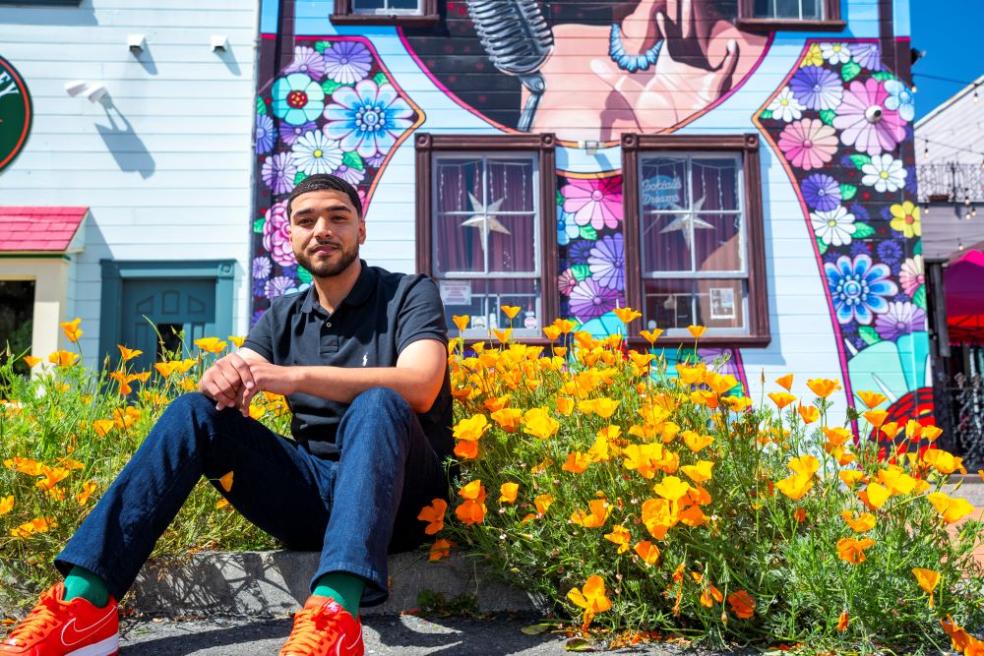
Now, as a recent graduate of Cal Poly Humboldt’s Ethnic Studies program and a graduate student in the Environment & Community program, Harp’s commitment to grassroots action and supporting Black students is being recognized as the California State University Chancellor Emeritus Charles B. and Catherine Reed Scholar.
Harp is one of 23 students to receive the 2024 California State University (CSU) Trustees' Award for Outstanding Achievement for their superior academic and personal achievement. The award grants students scholarships based on academic achievements, financial need, excellence in community service, and personal hardship. These exemplary students—one from each CSU university—were honored during a ceremony as part of the CSU Board of Trustees meeting on Tuesday, Sept. 24.
Harp’s journey from Galveston, Texas, to Cal Poly Humboldt is one of perseverance, empowerment, and advocacy for change. Born in Galveston and raised between the southside of Houston and Philadelphia, Harp faced numerous challenges, including losing his father and experiencing homelessness, but his dedication to community and education propelled him forward.
Harp’s work at Humboldt has focused on empowering students from underserved communities, particularly by creating spaces for cultural connection. This passion led him to establish the non-profit organization Black to Our Roots, which assists Afro-descendant students in genealogical research, fosters community engagement, and increases representation in academia.
“I felt like there was a large gap in the experience for Black students in the California school system,” Harp says. “There are very few retention efforts for Black students, and when I came to Cal Poly Humboldt, I started finding ways to engage with my community both on and off campus.”
Harp has focused much of his work on bridging the disconnect between Black students and the local Humboldt community. He believes that when students feel a sense of belonging and connection to their culture and community, they are more likely to thrive academically and emotionally. Harp’s research in the Environment & Community program supports this idea, with studies showing that engaging with one's culture positively impacts mental health and academic performance.
“We have a lot of cultural needs,” Harp says, “and a lot of my work right now is centered around foodways. My master’s thesis, which is grant-funded, explores the development of Black culinary traditions. Cooking and sharing food, especially meals tied to ancestral roots, can create community and provide healing. It's about more than food—it's about storytelling and connection.”
Harp’s commitment to food and community shines through his pop-up events, where he shares meals inspired by Black and Afro-Indigenous foodways. He has served dishes such as jambalaya at local events, bringing people together over shared traditions.
Harp also founded Black to Our Roots as a way to provide structural support for small Black businesses, while celebrating Black culture and heritage. “Our nonprofit is about bridging the gap between celebratory events and focused programming. We want Black students and community members to feel connected to their heritage, even in predominantly white spaces,” he said.
Harp’s passion for education and community engagement made him a natural fit for the CSU Trustees Scholarship. “The scholarship is a blessing. It alleviated some of the stress of graduate school expenses and allowed me to continue focusing on my work. I think accessibility to education is crucial, especially for Black, Indigenous, and other students of Color.”
Harp is driven not only by his love of learning but also by his desire to create pathways for others. From his early days in Philadelphia, where he would spend hours in the library reading about dinosaurs, to his current work advocating for educational opportunities for Black students, Harp’s passion has always been rooted in knowledge.
“I think a lot of students give up on education because of barriers,” he says. “But accessing information is fun—it’s something everyone enjoys if it’s made more accessible. I hope to help remove those barriers and encourage students to keep learning, especially about their own history and culture.”
As he looks to the future, Harp’s ambitions continue to grow. He is applying for a Fulbright scholarship to study abroad and pursue a Ph.D. in Africana Studies. His long-term goal is to continue advocating for underserved communities, empowering individuals through education, and creating lasting change.